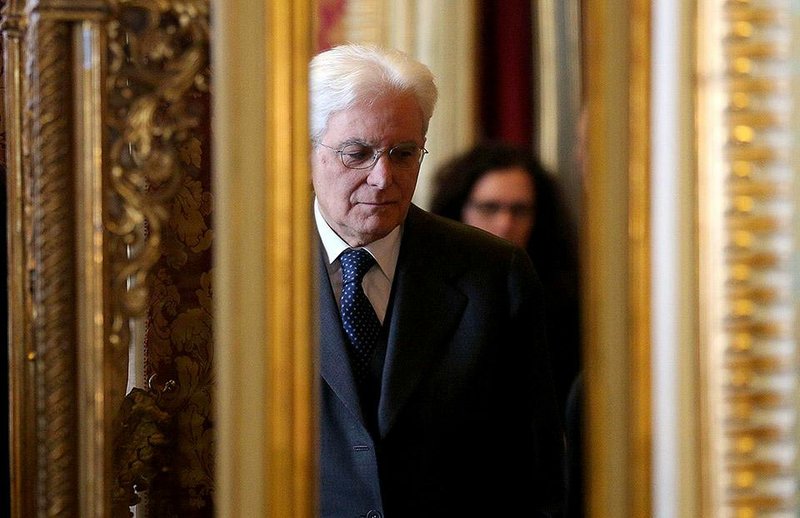ROME -- Sergio Mattarella, a Constitutional Court justice widely considered to be above the political fray, was elected Saturday as Italy's president in the third day of balloting by lawmakers.
He quickly set as priorities attention to his country's moribund economy and the need for unity in Europe's fight against a "new season of terror."
Mattarella's election as head of state was clinched when he amassed 505 votes -- a simple majority. The former minister, 73, with center-left political roots went on to garner a total of 665 votes from the 1,009 eligible electors.
Known as a man of few words, Mattarella cemented that reputation with his first remarks to the nation.
"My thoughts go, above all, and before everything, to the difficulties and hopes of our fellow citizens. That's enough," he said in brief comments at his court office just down the street from the presidential palace. Italy is mired in recession and unemployment has hovered about 13 percent nationally. Young Italians are increasingly seeking work abroad.
Then he applied a European-wide vision to his largely ceremonial post when he made a surprise, private visit to the Ardeatine Caves, a monument to Rome's victims of its World War II Nazi occupiers, on the city's outskirts. After pausing in reflection there, Mattarella hailed the wartime alliance "between nations and peoples that knew how to defeat Nazi, racial, anti-Semitic and totalitarian hate" and called for more of the same solidarity now.
"The same unity in Europe and in the world will know how to defeat those who want to drag us into a new season of terror," the presidential palace quoted him as saying.
Prime Minister Matteo Renzi pushed hard for Mattarella's election, and some of Renzi's Democrats resented the premier's imposing his choice on them. Mattarella's victory signals that Renzi for now succeeded in closing fractious ranks, including former Communists, in the governing coalition's main party.
"Thanks for being serious," Renzi and some loyalists wrote in a text message to Democrats during the balloting, the Italian news agency ANSA reported.
Former Prime Minister Silvio Berlusconi's center-right opposition vowed to cast blank ballots. While acknowledging Mattarella's credentials to be guarantor of the constitution and arbiter in political crises, they insisted Renzi should have reached agreement first with Berlusconi on a candidate.
Mattarella raised conflict-of-interest concerns when media mogul Berlusconi jumped into politics two decades ago. He also resigned as education minister in 1990 to protest legislation that helped Berlusconi transform what started out as several local channels into a business empire including Italy's three main private TV networks.
Mattarella, a Sicilian, was first elected to Parliament in 1983. His Christian Democrat party collapsed in corruption probes of the 1990s, but Mattarella was unscathed. His older brother, Piersanti Mattarella, governor of Sicily, was killed in 1980 by the Mafia.
The silver-haired Mattarella, a widower with three grown children, has been living in the quarters of Constitutional Court justices in Rome. He will take the oath of office, for a seven-year term, on Tuesday.
A year ago, Berlusconi pledged his support for the electoral change agenda of Renzi, who had just assumed the Democratic Party leadership. Buoyed by the deal, Renzi quickly pushed fellow Democrat Enrico Letta out of the premiership. Berlusconi lost his Senate seat because of a tax fraud conviction but is keen on keeping political influence.
The agenda includes changing Italy's electoral law to make governments more stable. Whether Berlusconi, irked over Renzi's picking the presidential candidate, will renege on the deal is unclear. A pro-Berlusconi lawmaker, Maurizio Gasparri, predicted the media mogul's center-right lawmakers might be "less generous" with support.
Former Berlusconi allies now in Renzi's coalition chafed at the unilateral choice of the Mattarella candidacy. But the government's short-term survival seemed little threatened. Politicians are generally not eager to provoke a crisis that could bring early elections, with voters upset over their leaders' failure so revive the economy.
Renzi's choice of Mattarella as a nominee despite Berlusconi's opposition "will undoubtedly increase friction within and without the ruling coalition," London-based Eurasia Group analyst Federico Santi said in a statement on the eve of the successful balloting. "It may complicate reform progress at the margin. However, it will not derail reforms or threaten political stability."
A Section on 02/01/2015
